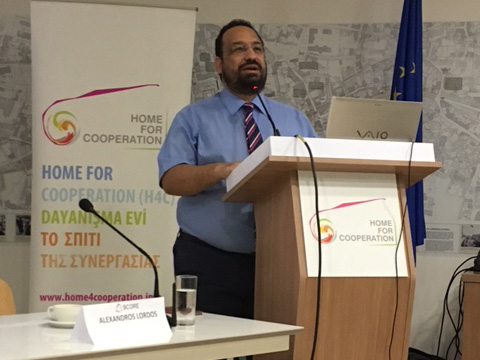The SCORE Index Sheds Light on Peace Prospects in Cyprus

Young Greek Cypriots and right-wing Turkish Cypriots are more hesitant to reach a political settlement with the other community. These are among the findings of the latest SCORE Index, released on 26 November in Nicosia by Interpeace’s partner in Cyprus, the Centre for Sustainable Peace and Democratic Development, known as SeeD. The Index gauges the level of social cohesion, reconciliation and readiness for political compromise in the Greek Cypriot and Turkish Cypriot communities.
The release of the findings came during an intensified phase of peace negotiations which are being brokered by the United Nations. The findings, which have been shared with the local policy-makers, the UN and other international actors, include:
• In general, individuals who are more satisfied with civic life and feel well-represented by their institutions are more ready for political compromise (as found in the 2014 SCORE Index).
• Deterioriating scores on indicators of inter-group relations among Turkish Cypriots (as compared to the SCORE 2013 and 2014) indicate that they are less ready for compromise.
• Roughly half of Greek Cypriot and Turkish Cypriot respondents said they find federation tolerable, yet only 29% and 28% respectively said they would vote “yes” in a future referendum.
• The SCORE policy recommendations were developed through a participatory dialogue process with various segments of the society (including women, politically affiliated youth, and human rights activists) from both communities. In the Greek Cypriot community, recommendations urged greater engagement of – and voice given to – young people, women and those who live outside Nicosia.
• For Turkish Cypriots, measures included raising awareness about their post-settlement status, in order to assure them that they would have more effective institutions and that there would be a key role for those in the right-wing.
• In both communities, political and civic leaders should articulate the strengths inherent in a multicultural society, including the economic, social and political benefits.
The focus group discussions also helped ensure local “ownership” of the findings, said SeeD co-research director Alexandros Lordos. “Local deliberations around SCORE results are essential for social impact,” he said. Lordos stressed that all actors – policy-makers, members of the negotiation teams, local authorities and civil society organizations – take the evidence into account in order to develop strategies that bring the communities closer together and inspire positive perceptions among them.
The research findings also help civil society organizations determine which areas to strengthen, said Jasmine Kim-Westendorf, lecturer at La Trobe University in Australia, who also spoke at the launch event. " SCORE fills a very deep gap,” she said, “because policy makers are focused more on institution building but not on the dynamics at the local level and that is where SCORE comes in.”
It is indeed one of the best tools for the international community, said Christopher Louise of UNDP-ACT, which supported the development of the Index. “The methodology of SCORE is so robust that it can be transported to other contexts and it has successfully done so,” he said. So far, SCORE has been implemented three times in Cyprus, once in Bosnia-Herzegovina, once in Nepal and currently in Ukraine.
The SCORE Index is a partnership project between UNDP-ACT, USAID and SeeD.
More information can be found at www.seedsofpeace.eu and the SCORE Platform at www.scoreforpeace.org.
